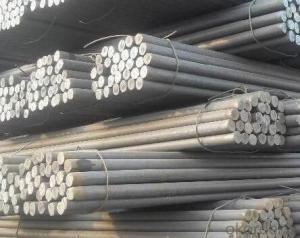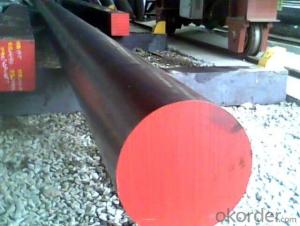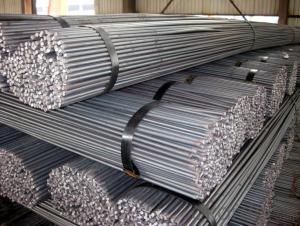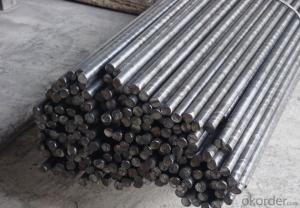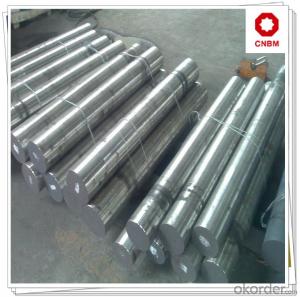Chrome Chinese Standard Round Bar with Prime Newly Produced Hot Rolled Alloy
- Loading Port:
- Tianjin
- Payment Terms:
- TT or LC
- Min Order Qty:
- 50 m.t.
- Supply Capability:
- 10000 m.t./month
OKorder Service Pledge
OKorder Financial Service
You Might Also Like
Item specifice
Product Description:
OKorder is offering Chrome Chinese Standard Round Bar with Prime Newly Produced Hot Rolled Alloy at great prices with worldwide shipping. Our supplier is a world-class manufacturer of steel, with our products utilized the world over. OKorder annually supplies products to European, North American and Asian markets. We provide quotations within 24 hours of receiving an inquiry and guarantee competitive prices.
Product Applications:
Chrome Chinese Standard Round Bar with Prime Newly Produced Hot Rolled Alloy re ideal for structural applications and are widely used in the construction of buildings and bridges, and the manufacturing, petrochemical, and transportation industries.
Product Advantages:
OKorder's Chrome Chinese Standard Round Bar with Prime Newly Produced Hot Rolled Alloy are durable, strong, and resist corrosion.
Main Product Features:
· Premium quality
· Prompt delivery & seaworthy packing (30 days after receiving deposit)
· Corrosion resistance
· Can be recycled and reused
· Mill test certification
· Professional Service
· Competitive pricing
Specifications of Chrome Chinese Standard Round Bar with Prime Newly Produced Hot Rolled Alloy
1. Grade: Q195, Q235, Q345
2. Diameter: 6mm-150mm
3. Length: 6m, 9m, 12m or as customer’s request
4. Tolerance: Within ±5% for weight; ±2mm for diameter
5. Note: The price can be better is the quantity is good
6. Chemical composition
Alloy No | Element (%) | ||||
C | Mn | S | P | Si | |
Q195 | 0.06-0.12 | 0.25 | ≤0.05 | ≤0.045 | ≤0.3 |
Q235 | 0.12—0.20 | 0.3—0.7 | ≤0.045 | ≤0.045 | ≤0.3 |
Q345 | ≤0.2 | 1.00-1.60 | ≤0.045 | ≤0.045 | ≤0.55 |
Usage and Applications of Chrome Chinese Standard Round Bar with Prime Newly Produced Hot Rolled Alloy
1. Chinese standard steel bar is often used where large amounts of steel need to be formed, for example as structural steel.
2. And we can use this kind of product on the performance of the mechanical parts if the demand is not very high.
3. Steel round bar is used in construction and a large number of architectural and engineering structures.
Packaging & Delivery of Chrome Chinese Standard Round Bar with Prime Newly Produced Hot Rolled Alloy
Packaging Detail: All goods are packed in bundle with steel strips and shipped by break bulk vessel or container (depend on target market and different ports)
Delivery Detail: 45 days
Trade terms: FOB, CFR, CIF
MOQ: 25 tons per specification; we can negotiate the quantity if the specification is normal or we have stock of one specification.
Weight: The price invoicing on theoretical weight basis or actual weight basis depends on customer’s request.
Shipment: The shipment of bulk break or container is depends on customer’s request and the situation of the port of destination.
Documents given: Full set of original clean on board bill of lading; Original signed commercial invoice; Original packing list; Policy of insurance; Certificate of origin and what the target market needs.
Production Flow of Chrome Chinese Standard Round Bar with Prime Newly Produced Hot Rolled Alloy
1. The common processes are preheated forging quenching, dual refinement solution process, cooling quenching and isothermal quenching. We use heat treatment for dual refinement solution process.
2. Material prepare (billet) — heat up — rough rolling — precision rolling — cooling — packing — storage and transportation
Characteristics of Chrome Chinese Standard Round Bar with Prime Newly Produced Hot Rolled Alloy
1. The steel in which the main interstitial alloying constituent is carbon in the range of 0.12–2.0%.
2. As the carbon percentage content rises, steel has the ability to become harder and stronger through heat treating; however it becomes less ductile.
3. Quality should be in conformity with the specification of the manufacturer. Quantity and packing conditions should be in conformity with the term in the contract.
4. Regardless of the heat treatment, higher carbon content reduces weld ability. In carbon steels, the higher carbon content lowers the melting point.
FAQ:
Q1: Why buy Materials & Equipment from OKorder.com?
A1: All products offered byOKorder.com are carefully selected from China's most reliable manufacturing enterprises. Through its ISO certifications, OKorder.com adheres to the highest standards and a commitment to supply chain safety and customer satisfaction.
Q2: How do we guarantee the quality of our products?
A2: We have established an advanced quality management system which conducts strict quality tests at every step, from raw materials to the final product. At the same time, we provide extensive follow-up service assurances as required.
Q3: How soon can we receive the product after purchase?
A3: Within three days of placing an order, we will begin production. The specific shipping date is dependent upon international and government factors, but is typically 7 to 10 workdays.
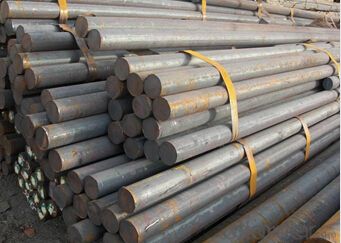
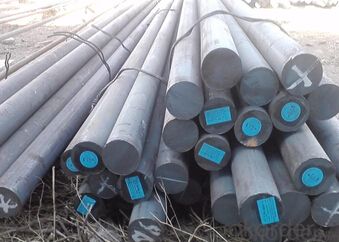
- Q:What are the common applications of steel round bars?
- Steel round bars are highly valued in various industries because of their strength, versatility, and durability. They find widespread use in different sectors, including construction, manufacturing, automotive, aerospace, energy and power, and the oil and gas industry. In construction, steel round bars are commonly employed for building frames, bridges, and infrastructure, providing structural support and withstanding heavy loads. They are also frequently used to reinforce concrete structures, enhancing their strength and resilience. The manufacturing industry relies on steel round bars for the production of various components and machinery. Gears, shafts, couplings, and axles are commonly fabricated using these bars due to their excellent machinability and ability to withstand high levels of stress and pressure. Within the automotive sector, steel round bars are extensively used to manufacture critical components such as crankshafts, steering systems, suspension parts, and axles. Their high tensile strength and resistance to wear and tear play a crucial role in ensuring the safety and reliability of vehicles. The aerospace industry heavily depends on steel round bars for the production of aircraft components, including landing gear, propeller shafts, and structural elements. Steel's high strength-to-weight ratio and exceptional fatigue resistance make it an ideal choice for withstanding the extreme conditions experienced in aerospace applications. In the energy and power sector, steel round bars are employed in the manufacturing of equipment like turbines, generators, and power transmission systems. Steel's ability to handle high temperatures and its resistance to corrosion make it a suitable material for these applications. The oil and gas industry extensively utilizes steel round bars for the production of drilling equipment, pipelines, and valves. Steel's resistance to corrosion and high-pressure environments makes it an indispensable material in this sector. In conclusion, steel round bars find a multitude of applications across industries due to their strength, versatility, and resistance to wear and tear. They play a crucial role in construction, manufacturing, automotive, aerospace, energy and power, as well as the oil and gas industry.
- Q:What are the advantages of using weather-resistant steel round bars?
- Weather-resistant steel round bars have several advantages. Firstly, they have a higher resistance to corrosion compared to regular steel, making them ideal for outdoor applications or environments with high humidity or exposure to saltwater. Secondly, they have excellent strength and durability, allowing them to withstand harsh weather conditions, such as extreme temperatures, heavy rains, and strong winds. Additionally, these round bars require minimal maintenance, saving time and money in the long run. Overall, weather-resistant steel round bars provide enhanced longevity and performance, making them a reliable choice for various construction and industrial purposes.
- Q:Can steel round bars be bent?
- Yes, steel round bars can be bent. The flexibility of steel allows it to be shaped and manipulated into various forms, including bending round bars into desired angles or curves.
- Q:What is the difference between a forged and a ground steel round bar?
- The manufacturing processes and resulting characteristics of a forged steel round bar and a ground steel round bar differ significantly. To create a forged steel round bar, the steel is subjected to high temperatures and then shaped using mechanical pressure, typically with a hammer or press. This process aligns the grain structure of the steel, enhancing its strength and durability. The forged steel round bars are renowned for their exceptional strength, impact resistance, and overall toughness. They find widespread use in applications that demand high strength, such as heavy machinery, automotive parts, and construction equipment. On the contrary, a ground steel round bar is manufactured using a grinding process. Once the steel is initially shaped, it undergoes precise grinding to achieve the desired dimensions and surface finish. This grinding process eliminates any imperfections or irregularities on the surface, resulting in a smooth and polished appearance. Ground steel round bars are commonly employed in applications that necessitate precise dimensions, like shafts, axles, and precision tools. In conclusion, the primary distinction between a forged steel round bar and a ground steel round bar lies in their manufacturing processes and resultant properties. The forged steel round bar offers superior strength and toughness due to the alignment of its grain structure, making it a suitable choice for heavy-duty applications. Conversely, the ground steel round bar is renowned for its precise dimensions and polished surface finish, rendering it an ideal option for applications that require precision.
- Q:What are the different types of corrosion-resistant steel round bars?
- There are several different types of corrosion-resistant steel round bars available in the market. Some of the commonly used types include: 1. Stainless Steel Round Bars: Stainless steel is a popular choice for corrosion-resistant applications due to its high resistance to rust and corrosion. It contains chromium, which forms a protective oxide layer on the surface of the steel, preventing further corrosion. 2. Duplex Stainless Steel Round Bars: Duplex stainless steel is a type of stainless steel that contains a balanced combination of austenite and ferrite microstructures. This gives it excellent corrosion resistance, high strength, and good weldability. 3. Nitronic Stainless Steel Round Bars: Nitronic stainless steel is a high-performance alloy that offers superior corrosion resistance, high strength, and good ductility. It contains nitrogen, which enhances its resistance to pitting and crevice corrosion. 4. Alloy Steel Round Bars: Alloy steel is a type of steel that is alloyed with various elements to improve its properties. Some alloy steels, such as corrosion-resistant alloys (CRA), are specifically designed to resist corrosion in harsh environments. These alloys typically contain elements such as chromium, nickel, and molybdenum. 5. Aluminum Round Bars: While not technically steel, aluminum round bars are often used in applications where corrosion resistance is essential. Aluminum forms a protective oxide layer on its surface, which helps prevent corrosion. It is particularly suitable for applications where weight is a concern. 6. Copper-Nickel Round Bars: Copper-nickel alloys, such as Cu-Ni 90/10 and Cu-Ni 70/30, are widely used in marine and offshore applications due to their excellent resistance to seawater corrosion. These alloys have high strength, good ductility, and exceptional resistance to biofouling. These are just a few examples of the different types of corrosion-resistant steel round bars available. The choice of material depends on the specific application requirements, environmental conditions, and budget considerations. It is important to consult with a materials engineer or specialist to select the most suitable corrosion-resistant steel round bar for a particular application.
- Q:Can steel round bars be coated or plated?
- Steel round bars can indeed be coated or plated, which is a prevalent method employed to augment the functionality and visual appeal of steel products. Numerous choices exist for coating and plating, including zinc plating, chrome plating, nickel plating, and powder coating. These procedures offer added defense against corrosion, enhance durability, and create the desired aesthetics for the steel. The selection of the appropriate coating or plating technique hinges upon the particular application and specifications of the steel round bars.
- Q:What's the difference between pure iron round steel and electromagnetic pure iron bar?
- It's another matter! So to sum up, the two are in principle a kind of thing! However, some of the small partners who are strong in pure iron are accustomed to using "round bar" to indicate some big caliber specifications. "Bar material" is used to indicate the specifications of small caliber.
- Q:Can steel round bars be bent or formed into different shapes?
- Steel round bars have the capability to undergo bending or shaping into diverse forms. Steel possesses a remarkably malleable nature, signifying that it can be easily molded sans any fracturing or cracking. To achieve the bending or shaping of steel round bars, multiple techniques can be employed, including the application of heat to enhance pliability or the utilization of specialized tools like hydraulic benders or presses. The extent to which steel round bars can be bent or shaped is contingent upon factors such as steel thickness, composition, and the desired specific form or angle. In a broader sense, steel round bars provide a versatile choice for fabricating a wide array of shapes and structures that are indispensable in various industries, encompassing construction, automotive, and manufacturing.
- Q:Are steel round bars suitable for bridge construction applications?
- Steel round bars are widely utilized in the construction of bridges. They possess numerous benefits for this purpose, such as their remarkable strength, durability, and versatility. These bars have the ability to withstand heavy loads and provide the essential structural support required for bridges. Furthermore, their fabrication and welding processes are easily manageable, resulting in efficient construction procedures. Incorporating steel round bars into bridge construction ensures the resistance of bridges to corrosion, a crucial aspect in environments exposed to moisture or severe weather conditions. Overall, steel round bars are an ideal and frequently employed material in bridge construction due to their strength, durability, versatility, and corrosion resistance.
- Q:What is the maximum sulfur content allowed for steel round bars?
- The maximum sulfur content allowed for steel round bars typically depends on the specific grade or standard being followed. However, in general, the maximum sulfur content is often restricted to 0.050% or 0.060% by weight.
1. Manufacturer Overview |
|
|---|---|
| Location | |
| Year Established | |
| Annual Output Value | |
| Main Markets | |
| Company Certifications | |
2. Manufacturer Certificates |
|
|---|---|
| a) Certification Name | |
| Range | |
| Reference | |
| Validity Period | |
3. Manufacturer Capability |
|
|---|---|
| a)Trade Capacity | |
| Nearest Port | |
| Export Percentage | |
| No.of Employees in Trade Department | |
| Language Spoken: | |
| b)Factory Information | |
| Factory Size: | |
| No. of Production Lines | |
| Contract Manufacturing | |
| Product Price Range | |
Send your message to us
Chrome Chinese Standard Round Bar with Prime Newly Produced Hot Rolled Alloy
- Loading Port:
- Tianjin
- Payment Terms:
- TT or LC
- Min Order Qty:
- 50 m.t.
- Supply Capability:
- 10000 m.t./month
OKorder Service Pledge
OKorder Financial Service
Similar products
New products
Hot products
Hot Searches
Related keywords
